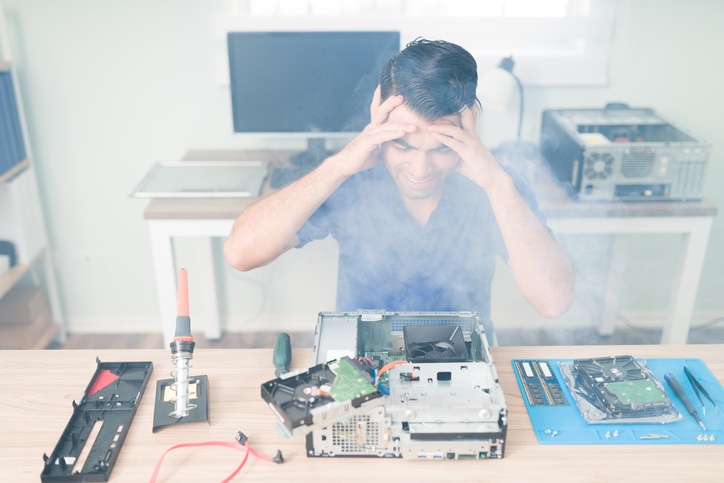Serving the Dallas Fort Worth Area & Nationwide

Hard Drive & Electronics Destruction: Facts and Myths
In the digital age, data security is a critical concern for individuals and businesses alike. The proper destruction of hard drives and electronic devices is essential to ensure that sensitive information does not fall into the wrong hands. However, there are many misconceptions surrounding this process. This article will address common myths and present the facts about hard drives and electronics destruction in an easy-to-understand Q&A format.
Myth 1: Deleting Files or Reformatting a Hard Drive Permanently Deletes Data
Deleting files or reformatting a hard drive does not permanently erase the data. When files are deleted, they are not immediately removed from the drive. Instead, the system marks the space as available for new data. This means that the original data remains intact on the drive until it is eventually overwritten by new information. Reformatting a hard drive, while it may appear to wipe the slate clean, changes the file system structure by creating a new directory layout. However, the underlying data is still present and can be accessed using specialized data recovery software. Such software can scan the drive for remnants of old files, making it possible to retrieve data that was thought to be erased.
Fact 1: Physical Destruction Ensures Data Cannot Be Recovered
Physical destruction is the most reliable method to ensure data cannot be recovered. This involves shredding, crushing, or otherwise physically damaging the drive to the point where data recovery is impossible. Shredding involves breaking the hard drive into tiny fragments while crushing deforms the drive’s platters and components beyond recognition. Certified destruction services use equipment designed to thoroughly destroy hard drives and other electronic devices. These services follow strict protocols to guarantee complete data destruction and provide a certificate of destruction as proof of compliance with data protection regulations. This certificate serves as an official document that confirms the secure disposal of data, offering peace of mind and legal assurance to individuals and businesses.
Myth 2: All E-Waste Can Be Thrown in the Trash
It is not okay to throw e-waste in the trash. Many electronic devices contain hazardous materials like lead, mercury, and cadmium, which can have serious environmental and health impacts if not disposed of properly. When e-waste is thrown in the trash and ends up in landfills, these toxic substances can leach into the soil and contaminate groundwater supplies. Over time, this contamination can harm ecosystems, wildlife, and even human health. Additionally, improper disposal of e-waste contributes to the growing problem of electronic waste accumulation, which poses significant challenges for waste management systems.
Fact 2: Proper E-Waste Recycling Protects the Environment
Certified recycling centers are specially equipped to handle electronic waste and follow stringent guidelines to ensure safe and effective recycling. At these facilities, electronic devices are carefully dismantled to separate valuable materials, such as metals and plastics, from hazardous components. Metals like gold, silver, copper, and aluminum are extracted and recycled, reducing the need for mining and conserving natural resources. Plastics are also processed for reuse in new products.
Recycling centers take particular care in managing hazardous substances found in e-waste, such as lead, mercury, cadmium, and brominated flame retardants. These toxic materials are safely extracted and treated to prevent them from contaminating the environment. Proper handling and disposal of hazardous waste protect soil and water quality, as well as safeguarding human health.
Myth 3: DIY Destruction Methods Are Just as Effective as Professional Services
DIY destruction methods, such as hammering or drilling holes into a hard drive, are not as effective or reliable as professional destruction services. Although these methods can cause visible damage to the drive, they often fail to completely obliterate the data stored within. Hammering may dent or break the drive, and drilling holes can disrupt some of the internal components, but significant portions of the data can still remain intact and accessible to skilled data recovery experts. These amateur techniques do not address the need for comprehensive data destruction, leaving a considerable risk of data breaches.
Fact 3: Certified Destruction Services Ensure Compliance and Security
Certified destruction services provide compliance with legal and regulatory requirements, secure handling of sensitive data, and thorough documentation of the destruction process. Compliance with data protection laws, such as GDPR, HIPAA, and various industry-specific regulations, is a major concern for organizations of all sizes. Certified destruction services are well-versed in these regulations and follow industry standards and best practices to ensure that data destruction processes meet or exceed legal requirements.
Moreover, certified destruction services guarantee the secure handling of sensitive data throughout the entire destruction process. They employ highly trained professionals and utilize advanced equipment specifically designed for data destruction. These professionals understand the complexities and risks associated with data storage devices and use precise methods to ensure that data is irreversibly destroyed.
Certified destruction services also issue certificates of destruction. These serve as official proof that the data has been securely and permanently destroyed in accordance with regulatory standards.
Myth 4: Small Businesses Do Not Need Professional Destruction Services
Contrary to the belief that only large corporations require professional destruction services, small businesses also need these services for their electronic devices. Data security is crucial for businesses of all sizes, as even a minor data breach can lead to significant financial and reputational damage. Small businesses often handle sensitive information, including customer data, financial records, and proprietary business information. If this data falls into the wrong hands, it can result in identity theft, financial fraud, and loss of customer trust.
Fact 4: Data Security is Critical for All Businesses
Professional destruction services are essential for all businesses to protect their sensitive information effectively. By using advanced equipment and techniques, we can ensure that data stored on electronic devices is irreversibly destroyed. By doing so, we eliminate the risk of your data being recovered and misused. Professional services provide a level of thoroughness and reliability that DIY methods cannot match, offering peace of mind that the data has been securely handled.
Call Secure On-Site Shredding
If you need reliable and secure destruction of your old hard drives and sensitive documents, Secure On-Site Shredding provides the best service to Dallas-Fort Worth and surrounding areas. Our state-of-the-art mobile shredding units come directly to your location, allowing you to witness the entire destruction process firsthand. Whether you’re a business needing to comply with data protection regulations or an individual seeking to protect your personal information, we have you covered.
Don’t leave your data security to chance. Trust Secure On-Site Shredding for efficient, eco-friendly, and compliant destruction services. Contact us today to schedule your shredding appointment.





